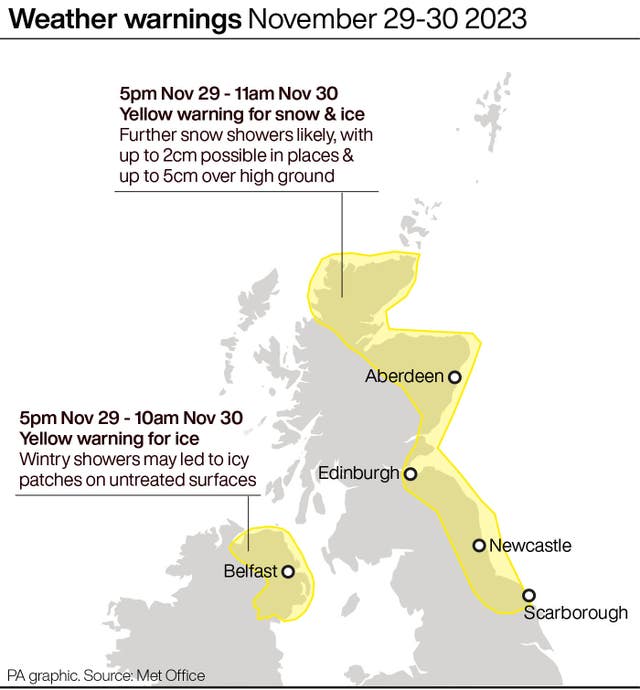Road users told to be wary of icy conditions as yellow weather warnings issued
Snow and ice forecast for large swathes of Scotland, eastern England, the South West and Northern Ireland.

Road users are being warned of icy conditions as the Met Office issued snow and ice yellow alerts for large areas of Scotland, England and Northern Ireland amid plummeting temperatures.
The national weather service has advised of the likelihood of people suffering slips and fall injuries in one of the first icy periods of the winter.
It is also advising of the chance of disruption to road, bus and rail networks – with ice patches forming on untreated roads, pavements and cycle paths.
One yellow warning – covering areas in north-east England, the East Midlands, the east of England, Yorkshire and Humber and parts of Scotland – will be active from 5pm on Thursday until 11am on Friday.

Another, affecting Cornwall, Devon, Dorset and Somerset, will be in place until 4pm on Thursday.
An earlier warning remains in place until 11am on Thursday for eastern Scotland and north-east England down to North Yorkshire, where snow caused closures on the A169.
A yellow ice warning for Northern Ireland is in place until 10am on Thursday.
Motoring organisation the RAC urged drivers to “ensure they’re winter ready as some get their first real taste of snow and ice”.
Met Office chief meteorologist Neil Armstrong said on Wednesday: “We’ve already seen snow settling in parts of eastern Scotland and north-eastern England.
“As the cold air continues to spread across the UK, we also expect to see some snow over the high ground of south-west England overnight and through tomorrow.
“Snow showers will continue along the North Sea coast with a north-easterly air flow, leading to further accumulations over higher ground.
“Where the showers fall as rain, there is a risk of icy patches forming overnight with temperatures widely dipping below freezing.”
For the rest of Thursday, southern counties of England can expect cloudy weather with patchy rain at times, falling as snow across the hills in the southwest.

It will be sunny elsewhere, with wintry showers towards coasts in the east. However, most places will remain dry with sunny spells that will develop into a widespread frost overnight.
Come Thursday evening, wintry showers may develop near the North Sea coasts and in parts of Northern Ireland.
Moving into Friday, the weather will remain cold with sunny spells and some wintry showers, mainly towards coastal areas.
It comes after temperatures plunged to a low of minus 7.2C in England as snow fell in Scotland, Northumberland and Yorkshire.
However, the Met Office has said it is too early to predict a white Christmas.
The forecaster said the three lowest temperatures recorded at its observation sites overnight were all in Cumbria on Wednesday, with a low of minus 7.2C in Bridgefoot, minus 6.5C in Shap and minus 6.1C in Keswick.
The BBC reported that parts of the UK had their coldest November night since 2010, and that it was minus 8C at Aonach Mor in the Scottish Highlands.
Met Office spokeswoman Nicola Maxey said on Wednesday it had already recorded snow in eastern Scotland, Northumberland and Yorkshire – with about 2cm of snow in some eastern coast areas and 5cm at Fylingdales on the North York Moors.
The UK is being hit by a blast of cold air from Scandinavia, causing a cold snap for many in the North.
Daytime temperatures are expected to drop to single-digit figures this week and night temperatures are expected to stay below freezing for large parts of England and Scotland.
Ladbrokes’ latest betting odds for snow to fall anywhere in the UK on Christmas Day are 1/2, and it says Edinburgh and Newcastle are the “most likely destinations to see snow”.
But the Met Office urged people to take a prediction this far in advance with a “pinch of salt”.
Ms Maxey added: “Christmas is still a month away, so it is impossible with this lead time to have any confidence in a detailed forecast.”
The UK Health Security Agency (UKHSA) has issued warnings of its own, with yellow and amber cold-health alerts for northern regions of England until December 5.




